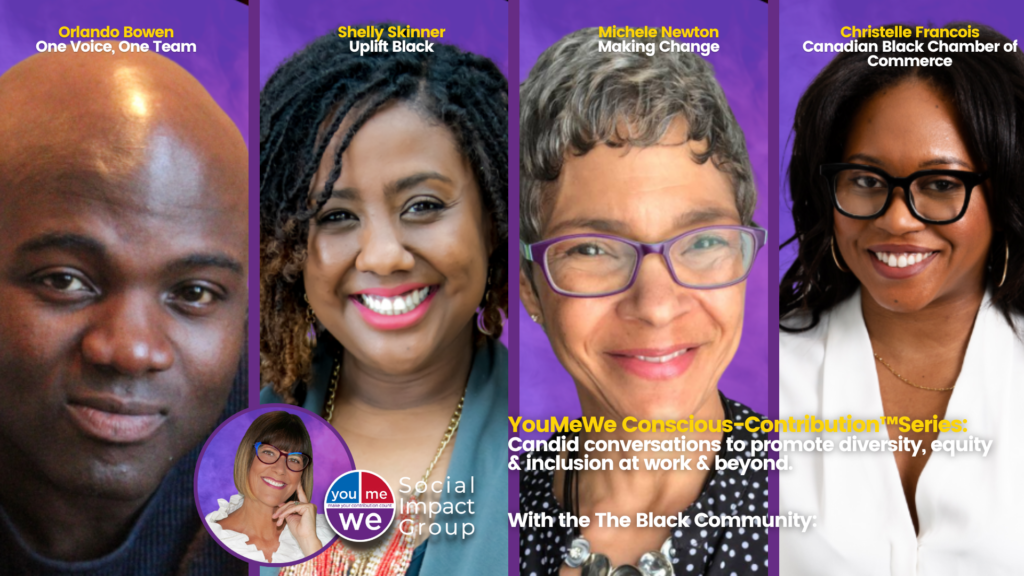Creating an inclusive culture incorporating diverse perspectives in business executions increases creativity, innovation, productivity, and profitability. But you know that. Research has been spouting such claims for years.
What can you, a Conscious leader, do to ensure you create a culture of “we” where everyone feels their contribution counts?
by Suzanne F. Stevens, Conscious Leadership and Social Contribution Cultivator, Founder, YouMeWe Social Impact Group Inc., Part of the Nobody Wants to Work Series.
Creating an Inclusive Culture starts with me.
In the last YouMeWe Infusion, we highlighted the importance of self-awareness to establish oneself as a Conscious leader. If you are unwilling to dive deep into your unconscious, leading from a place of inclusion will allude you.
That is why I offered you the opportunity to fill out a Potential Assessment so that you can bring your unconscious to your consciousness. Register for the assessment here { https://youmewe.ca/potential-assessment/& QR code}
Self-awareness is essential for conscious leaders because until we accept ourselves – with all our warts, scars, and blemishes, can we start to celebrate our resilience, perseverance, and growth. Only then can we create a tolerant culture that celebrates diverse perspectives.
If you have blind biases toward yourself, that bias will most definitely rear its head in your personal and professional interactions. However, if you love your authentic self, you can tolerate and appreciate the characteristics and behaviors of others that previously sounded like fingernails scratching the chalkboard.
So be kind to yourself so you can be kind to others.
Five Principles Conscious Leadership Live By
1. Conscious leaders use all their senses to create an inclusive culture.
Traditionally, only IQ (Intelligence Quotient) was assessed if someone could do a job. Yet, a leader can be intelligent but doesn’t have the emotional capacity to inspire colleagues to produce their best. So, Conscious leaders also rely on their EQ (Emotional Quotient/Intelligence), MQ (Moral Quotient/Intelligence), and BQ (Body Quotient/Intelligence) whole body intelligence.
Paying attention to all your senses makes way to rely on your intuition to help guide decisions. People have never made decisions just rationally; however, they often will rationalize something entirely emotional (think of that extra pair of shoes you bought).
Conscious leaders embrace their emotions and intuition to align with their authentic selves. From here, they see possibilities and abundance. They are more accepting and respond to situations (@Cause) rather than react to them (@Effect).
Our intuition is powerful and guides us. It rarely steers us wrong.
As Sri Aurobindo, an Indian philosopher, said, “intuition is a memory of truth.” It is that knowing you have without having all the facts.
Conscious Leaders stand by their gut without disregarding new perspectives and information.
2. Create an inclusive culture by being Accountable thru Transparency.
Being transparent and accountable is essential to create an inclusive culture.
Colleagues are accountable and acknowledge that if they don’t achieve their commitments, they will impact the whole. It is not motivated by recognition from the ‘boss’ but rather by contributing to a team’s success.
Being transparent about the organization goes beyond sharing the vision, mission, and values. It is fostering an ecosystem where everyone is measured against those values. Where salaries, promotions, benefits, and progressions are shared with the entire team.
Obviously, communication is vital to create a transparent culture. Complement the more formal methods (meetings, internal newsletters, town halls) with informal approaches to connect diverse colleagues.
Have a weekly (or daily) tea-time/coffee-time/whatever-time to share projects and progress. Advocate for teams to mastermind solutions that are outside their roles and responsibilities. Communicate with “Motivational Mondays,” where you share what is on their mind about the company, community, country, or anything that catches your fancy.
The more touchpoints a leader has with their team, and the team with each other, the more of a feeling and belief that “we are in this together.”
Knowledge is power, and power promotes ownership. Ownership places each person in control, empowering them to be responsible and accountable for their progress. And that provides dignity.
3. A Conscious Leader commits to Empowering and Collaborating.

A community leader Michèle Newton, shared on a Diversity, Equity, Inclusion, and Belonging panel series that I hosted, “If you are in a position of power or leadership, it is your duty and responsibility to leverage your power to empower others. That is what leaders do. Leaders empower others.”
To access the panel dialogue visit: https://youmewe.ca/deib-candid-conversations/
Conscious Leaders are committed to creating a “WE” culture, which includes empowering people within the organization and in the community.
The organization’s colleagues want to feel they are contributing to its success. They don’t want to follow you. They want to lead beside you. No matter their age or experience. The days of the hierarchical structures where power flows downward are collapsing.
Structures, such as Holacracy (https://www.holacracy.org/explore), where the power is placed in the collective, and people have roles, not titles. Barriers are removed where people aren’t bound by bureaucracy. Creativity is unleashed, and innovation is collaborative. It is a structure where the power is placed on its people. The entrepreneurial spirit thrives. And everyone collaboratively pursues the organizational purpose.
Conscious Leaders believe in collaboration, not competition – Yup, others can uplift your success. This is a fundamental shift from the “eat what you kill” world. So much nicer, don’t you think?
Companies cannot be all things to all people. Conscious Leaders know value-aligned partners can enhance an organization’s offerings. Partners focus on their strengths while bringing alternative solutions to the market.
4. Conscious Leaders are intentional.
Conscious Leaders are intentional. They create teams where colleagues feel included, valued, and cared for, setting the foundation for high trust where individuals can flourish.
Their decisions are based on context and the intent behind them. This cultivates a safe culture where people are encouraged to be candid and respectful of differences.
Conscious Leader are present. They focus on who is in front of them, not their phones :).
They acknowledge and accept their responsibility to establish a high-trust, high-performance, and high-happiness culture and are receptive to learning to achieve it.
5. Conscious Leaders’ commitment to an inclusive culture
Leaders empower their teams to be responsible for their environment by appreciating their genius and how it contributes to the overall mission.
Conscious Leaders consistently transform their worldviews, personal relationships, and company culture. They are committed to creating an inclusive culture that brings the best out of colleagues while achieving an organization’s mission.
As a result, barriers are removed, so anyone can achieve their aspirations. Conscious Leaders value everyone’s contribution to realizing the organization’s mission. And are dedicated to continuously learning and evolving for the betterment of the entire ecosystem they service – their family, company, and community.
One of the commitments that serve Conscious Leaders most is their ability to live in curiosity. They are curious about their colleagues, innovations, humanity, and solutions. They listen without judgment to understand, empathize, or appreciate.
The commitment to being curious keeps them receptive to possibilities.
What can you do now to make your contribution count?
Join us for the remaining series as we will be sharing Conscious leadership practices (quite frankly, human practices), where we highlight what motivates colleagues and how Conscious Leadership addresses them.
 Thanks for joining me! I’m Suzanne F. Stevens, and at YouMeWe Social Impact Group, we grow Conscious leaders, their influence, and social impact—sustainably.
Thanks for joining me! I’m Suzanne F. Stevens, and at YouMeWe Social Impact Group, we grow Conscious leaders, their influence, and social impact—sustainably.
As part of our commitment to this mission, I invite you to complete a Potential Assessment– a transformation tool highlighting your strengths and growth opportunities. youmewe.ca/potential-assessment/
The best part, it reveals the biggest barrier to reaching your FULL POTENTIAL—a $297 value with YouMeWe compliments. Visit youmewe.ca/potential-assessment/ to gain access to this accurate transformation tool.
The article was originally posted by %author_name% Originally posted on%post_title%
. This article originally posted on Source